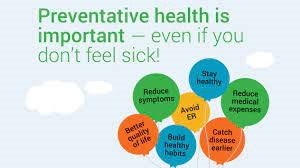The Importance of Preventive Health Care
Preventive health care is a proactive approach to maintaining health and well-being, emphasizing the prevention of illnesses and diseases before they occur. By focusing on prevention, individuals can lead healthier, longer lives and reduce the overall burden on the healthcare system. This article explores the significance of preventive health care and provides insights into how you can integrate it into your lifestyle.
Understanding Preventive Health Care
Preventive health care involves measures taken to prevent diseases, rather than treating them once they arise. This includes regular check-ups, screenings, vaccinations, and lifestyle modifications aimed at reducing the risk of chronic diseases such as heart disease, diabetes, and cancer. The goal is to identify potential health issues early and implement strategies to mitigate them.
Benefits of Preventive Health Care
Preventive health care offers numerous benefits, not only for individuals but also for society as a whole. Here are some key advantages:
1. Early Detection and Treatment: Regular screenings and check-ups can detect health issues early when they are easier and less costly to treat. Early intervention can prevent the progression of diseases and improve outcomes.
2. Improved Quality of Life: By preventing illnesses and managing health conditions proactively, individuals can enjoy a better quality of life. This includes maintaining mobility, mental clarity, and overall well-being.
3. Cost Savings: Preventive care can reduce healthcare costs by preventing the need for expensive treatments and hospitalizations. It’s more cost-effective to prevent a disease than to treat it.
4. Increased Longevity: Preventive measures, such as vaccinations and healthy lifestyle choices, can increase life expectancy by reducing the risk of life-threatening diseases.
Key Components of Preventive Health Care
Preventive health care encompasses various strategies and practices. Here are some essential components:
1. Regular Health Screenings: Regular screenings for blood pressure, cholesterol levels, blood sugar, and cancer can help detect potential health issues early. Follow your healthcare provider’s recommendations for screening schedules based on your age, gender, and risk factors.
2. Vaccinations: Immunizations protect against contagious and potentially deadly diseases. Ensure you and your family are up-to-date on recommended vaccines, including flu shots, measles, mumps, rubella (MMR), and human papillomavirus (HPV).
3. Healthy Diet and Nutrition: A balanced diet rich in fruits, vegetables, whole grains, lean proteins, and healthy fats supports overall health and helps prevent chronic diseases. Avoid processed foods, excessive sugar, and unhealthy fats.
4. Regular Physical Activity: Engaging in regular physical activity helps maintain a healthy weight, improves cardiovascular health, strengthens muscles and bones, and reduces the risk of chronic diseases. Aim for at least 150 minutes of moderate-intensity exercise per week.
5. Stress Management: Chronic stress can negatively impact health. Practice stress-reducing techniques such as meditation, yoga, deep breathing exercises, and hobbies that bring joy and relaxation.
6. Adequate Sleep: Quality sleep is essential for overall health. Aim for 7-9 hours of sleep per night to support immune function, mental health, and physical well-being.
7. Avoiding Harmful Behaviors: Avoiding smoking, limiting alcohol consumption, and abstaining from illicit drug use are crucial for preventing numerous health issues, including cancer, liver disease, and respiratory conditions.
The Role of Healthcare Providers
Healthcare providers play a critical role in preventive health care. They offer guidance, perform screenings, and administer vaccinations. Establishing a trusting relationship with your healthcare provider and attending regular check-ups is essential for maintaining good health. They can provide personalized advice based on your medical history, lifestyle, and risk factors.
Overcoming Barriers to Preventive Health Care
Despite its importance, many people face barriers to accessing preventive health care. Here are some strategies to overcome these challenges:
1. Awareness and Education: Increasing awareness about the benefits of preventive health care can motivate individuals to take proactive steps. Public health campaigns and education programs can play a significant role.
2. Accessibility and Affordability: Ensuring that preventive health services are accessible and affordable for all is crucial. This includes providing insurance coverage for screenings and vaccinations and offering services in underserved areas.
3. Personal Motivation: Encouraging individuals to prioritize their health and make preventive care a part of their routine is essential. Setting personal health goals and celebrating small achievements can help maintain motivation.
Conclusion
Preventive health care is a vital aspect of maintaining and improving health. By focusing on early detection, healthy lifestyle choices, and regular medical check-ups, individuals can prevent many diseases and lead healthier lives. Embracing preventive health care not only benefits individuals but also contributes to a more efficient and effective healthcare system. Start today by scheduling your next check-up, adopting healthier habits, and taking proactive steps towards a healthier future.
